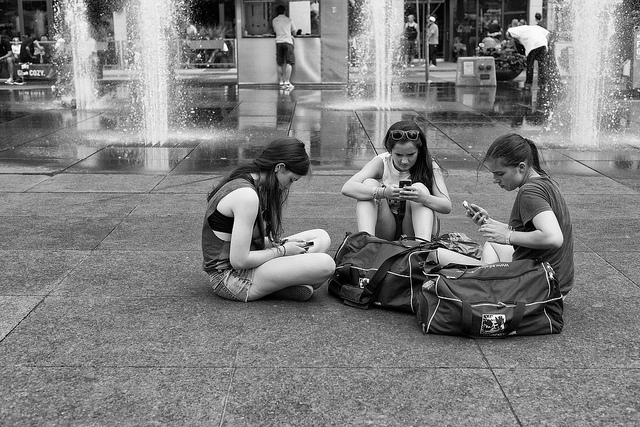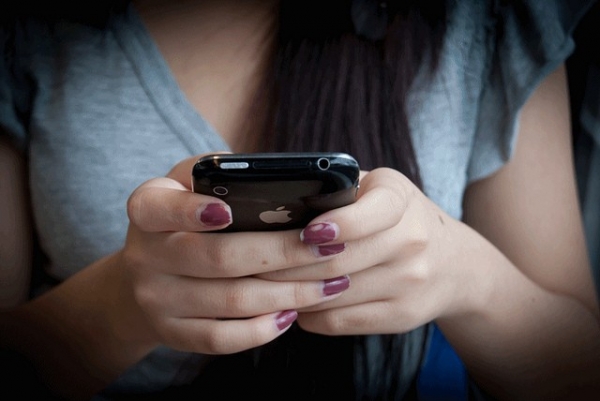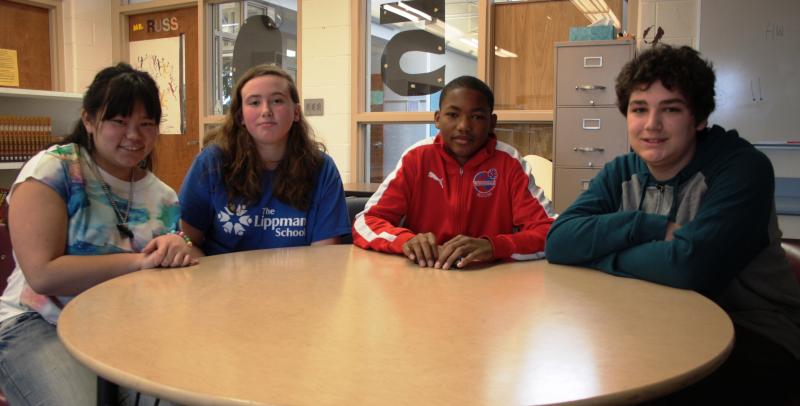Backyard barbecue sparks research project
Kent State researcher Andrew Lepp describes the backyard barbecue that inspired his latest project. "We had a bunch of kids in the back yard," says Lepp, "and the kids are running around having fun when one of them comes over to the porch and says, ‘Hey Dad, can I play with your iPhone?’”
The effect was instantaneous.
“Next thing you know all 10 kids stop playing," says Lepp, "they’re just all hunched over each other’s shoulders trying to get a glimpse of this little screen."
 The intrusion of technology was a light bulb moment for Lepp. He recognized that, "whenever these things are in children’s presence the kids stop playing, they stop being physically active.” The intrusion of technology was a light bulb moment for Lepp. He recognized that, "whenever these things are in children’s presence the kids stop playing, they stop being physically active.”
Friend and fellow researcher Jacob Barkley was also struck by the scene at the barbecue. He says, while being outside used to be an escape from things like TV that stifle activity, mobile technology has changed that.
“You now can create a sedentary environment anywhere," says Barkley.
Increased cell phone use equals lower grades
Barkley and Lepp turned their empirical eye on students at the Kent State campus to see how cell phones interfere not just with activity but with learning.
They found that with nearly limitless information and communication access, cell phones can be powerful educational tools, but, “that’s not what the majority of people are using it for the majority of the time," says Barkley, "most of what they’re doing is play.”
They found that eighty percent of the time cell phones are NOT used for school or business.
 Lepp says, all other variables being equal, “The one who uses the cell phone more is likely to have a lower GPA, the one who uses it less is likely to outperform his counterpart.” Lepp says, all other variables being equal, “The one who uses the cell phone more is likely to have a lower GPA, the one who uses it less is likely to outperform his counterpart.”
They’re not quite sure what’s behind the correlation, but Lepp thinks personality plays a role.
He says, “What we found was that the high users are much more susceptible to boredom during their free time.”
They found that high cell phone uses are also more likely to be challenge adverse, meaning that they're more easily put-off by the difficulties of course work in favor of screen time.
Berkley says high cell phone use is also linked to other indicators such as anxiety, depression, and lower life satisfaction.
Lippman's Tech Timeout Challenge
And it’s not only college students who fall prey to the lure of technology.
John Lynch is a bright, engaging eighth grader at The Lippman School in Akron, but like many his age, spends a lot of his free time in front of a screen.
He says, “It’s really because… I don’t have anything else to do.”
The Lippman School recently took part in the Tech Timeout Challenge, where students across the country were challenged to go three days without their devices.
Lynch says he couldn’t do it, but the challenge did lead to an important realization. He says, “I found that the more time I spent on technology, the less time I had to do stuff with other people.”
Seventh grader Korrine Averill did take-on the no-tech challenge. For three days she put away her iPhone, iPad, Xbox, and PC and faced the specter of boredom.
“I realized that sometimes being bored is not that bad because you can end-up doing other things,” says Averill.
In fact she found she was happier after stepping off the social media rat-race.
“I enjoyed not having my technology," says Averill, "I realized that it makes me sad seeing all the things other people are doing.”
John Bennett teaches technology at the Lippman School. His goal with the Tech Timeout Challenge was to start a dialogue about its role in our lives.
“It really did make them think," he says, "and it really brought to them another part of reality that they didn’t know existed but was always there.”
But Bennett recognizes that technology is here to stay and will only become more integrated into children’s lives, both in and out of school.
That's why he encourages kids to find a healthy relationship with the devices that consume so much of their time.
Today's top parenting challenge
It's a major challenge for parents to ensure children develop a healthy relationship with the online world.
Educational technology researcher Rick Ferdig at Kent State says parental engagement is key, and it starts with a conversation.
He recommends parents talk with kids who are caught-up in gaming, starting with simple questions like - "what did you play, tell me about what it was like, what did you do?”
He says parents need to sit down with the plugged-in kid and take part in their world.
“One of the best pieces of advice I give to parents about video games is game with your child,” says Ferdig.
Kent State’s Andrew Lepp says helping kids find a healthy balance is the biggest parenting challenge of our generation, and it can have lasting impact.
“So that when they get to college and they have that freedom," says Lepp, "they can make good choices on their own.”
Research reflects technology’s stranglehold on our attention, from the dangers of texting while driving, to lower GPA’s. But the message of moderation could be lost amid the clutter of our online lives as we become the distracted generation. |